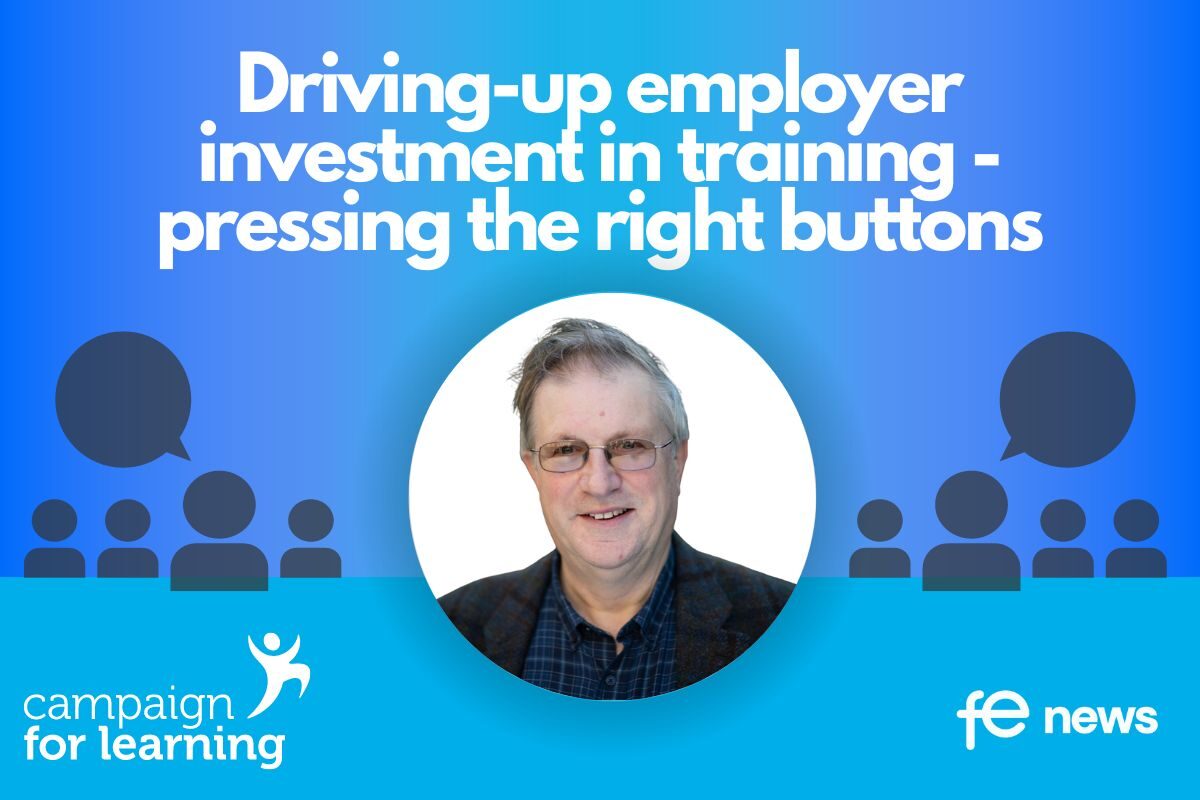Strategies to drive-up employer investment in training

The starting point for progress is to recognise that in England, the rights, roles and responsibilities of employers in relation to skills are remarkably unclear. It is impossible to find any answer to the fundamental question – what elements or aspects of initial or adult training are employers expected to contribute to, in what manner, and via what mechanisms?
Employers viewed as consumers of publicly funded education and training
The Government’s current notions of ‘employer leadership’ in the skills arena are narrowly- defined and focused on enhancing the power of employers as external consumers of the outputs of the publicly funded post-16 education and training system, rather than boosting their role as producers or co-producers of skill within that system.
Current institutional infrastructure
The institutional infrastructure through which government seeks to engage with employers consists of:
- Employer representative bodies delivering local skills improvement plans (LSIPs)
- The Institute for Apprenticeship and Technical Education (IfATE) and its trailblazer groups that set standards for apprenticeships and T Levels
- Local Enterprise Partnerships (LEPs) and their Skills Boards (now operating in the shadow of ERBs delivering LSIPs)
- Meetings with a group of large employers
- Meetings with the national business organisations, such as CBI, IoD, CIPD and British Chambers of Commerce (noting many local chambers are the lead employer body on LSIPs).
Gaping hole: sectoral representation
There is, however, a gaping hole where in other developed countries, an economy-wide pattern of sectoral representation would be.
Unfortunately, the UK Government chose to abandon a system of sectoral representation (Sector Skills Councils). It is now placing its hopes in the efficacy of employer representative bodies leading on LSIPs as the latest in a long line of local employer bodies (such as Local Employer Networks, Training and Enterprise Councils and Local Learning and Skills Councils).
Transmitting employer skills needs to the publicly funded system
The bulk of the activity undertaken through the existing set of employer representative bodies centres on encouraging firms to specify their skill needs and then transmit these to providers (awarding bodies, schools, colleges, universities and private providers). Asking employers what they want is plainly important, but asking them how they intend to help in delivering what is needed is even more critical. And yet, this is not happening.
Falling employer funding of training
What is striking is that this absence occurs against the stark backdrop of a long-term, persistent, and significant decline in the volume of training hours being delivered to the adult workforce, and also a reduction in employer investment in skills. Far from employer leadership on skills, what we are witnessing is a slow retreat, as most employers spend less and less.
As the National Audit Office has noted, “Government knows that employers’ spending on workforce training has fallen… but has not made clear to what extent it is seeking to influence employers to invest more in developing the skills of their own workforces” (Developing Workforce Skills for a Strong Economy, NAO, 2022).
Indeed, the overall judgement of the NAO is that “DfE is staking its success on a more employer-led system but, from the evidence we have seen, it is unclear whether the conditions are in place for this to be implemented successfully, in particular whether employers are ready to engage to the extent that will be needed to achieve a step-change in performance” (NAO, 2022).
Few policies to increase employer funded training or co-funded training
In short, other than the Apprenticeship Levy, there are no policies in place that aim to leverage more employer spending or action, and no mechanisms beyond LSIPs and trailblazer groups that can deliver collective employer activity. Unless and until this policy vacuum is filled, progress is very unlikely to occur.
Baby steps
Given the current lack of institutional capacity, political will and policy levers, ‘baby steps’ are all that can be essayed at present – but these steps are an essential precursor to and foundation for more specific policy interventions, such as any ‘reform’ of the levy.
Recommendation 1
Government needs to work out what it wants or expects employers to contribute and then discuss this with them, with the aim – however difficult to achieve – of creating a shared understanding of the respective rights, roles and responsibilities of state, individual and employer, as well as a set of shared long-term goals.
Recommendation 2
Government needs to think through how to develop and integrate the work of Local Enterprise Partnerships, Employer Representative Bodies leading on LSIPs, and the role of MCAs/local authorities in delivering business and skills support to local employers.
Recommendation 3
Government needs to set about re-creating a sustainable sectoral infrastructure that can concert and deliver employer action on skills forecasting and delivery.
By Ewart Keep, Professor Emeritus, Education Department, University of Oxford
This article is part of Campaign for Learning’s series: ‘Driving-up employer investment in training – pressing the right buttons’.
Part One: Employer investment in context
- Louise Murphy, Economist, Resolution Foundation: Investment in the round
- Dr Vicki Belt, Deputy Director, Enterprise Research Centre, Warwick Business School: UK enterprises and investment in capital and training
- Becci Newton, Director, Public Policy Research, Institute of Employment Studies: Employer investment in training in England
Part Two: Drivers of employer investment in training
- Neil Carberry, Chief Executive, Recruitment and Employment Confederation: Derived demand, British management and employer investment in training
- Ewart Keep, Professor Emeritus, Education Department, University of Oxford: Strategies to drive-up employer investment in training
- Sam Alvis, Head of Economy, Green Alliance: Transitioning to net zero, green skills and employer investment in training
- Dan Lucy, Director of HR, Institute of Employment Studies: Job quality, job design and driving-up employer investment in training
- Natasha Waller, Policy Manager, LEP Network: Local inward investment, business support and employer demand for training
- Jovan Luzajic, Acting Assistant Director of Policy, Universities UK: Universities, R&D, business innovation and meeting employer skills needs
- David Hughes, Chief Executive, Association of Colleges: FE colleges, business innovation and meeting employer skills needs
Part Three: Increasing employer investment in training
- Paul Bivand, Labour Market Consultant: Why should employers invest in training in a flexible labour market?
- Aidan Relf, Skills Consultant: Why should employers invest in training with large net worker migration into the UK?
- Stephen Evans, Chief Executive, Learning and Work Institute: Raising employer investment in training
- Robert West, Head of Education and Skills, CBI: Increasing employer investment in training
- Lizzie Crowley, Skills Policy Adviser, CIPD: Encouraging employer demand for training
- Anthony Painter, Director and Daisy Hooper, Head of Policy and Innovation Chartered Management Institute: Increasing employer demand for management training
Part Four: Raising employer demand for publicly funded post-16 education and skills
- Jane Hickie, Chief Executive, AELP: Increasing employer demand for post-16 apprenticeships in England
- Mandy Crawford-Lee, Chief Executive, UVAC: Increasing employer demand for level 4-5 technical education in England
- Ian Pryce, Principal, The Bedford College Group: Increasing employer demand for higher technical education in England
Part Five: Raising employer demand for work placements
- John Widdowson, Board Member, NCG: Increasing employer demand for work placements for level 3-5 vocational courses in England
- Stephen Isherwood, Joint Chief Executive, Institute of Student Employers: Increasing employer demand for undergraduate work placements in England











Responses